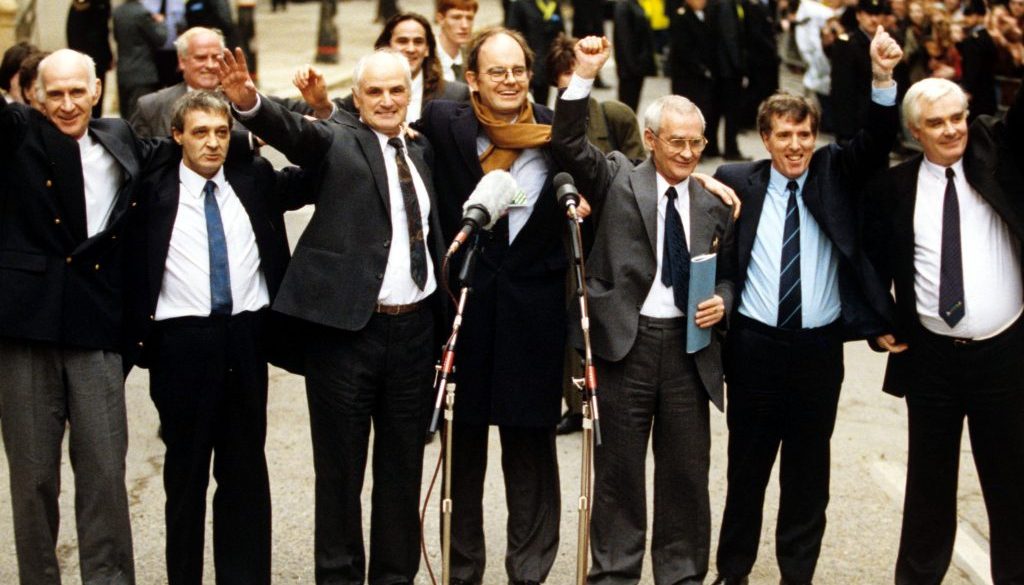On This Day 1991
The Birmingham Six were six Irishmen: Patrick Joseph Hill, Hugh Callaghan, Gerard Hunter, Richard McIlkenny, William Power and John Walker, who, in 1975, were each sentenced to life imprisonment following their wrongful convictions for the Birmingham pub bombings. Their convictions were declared unsafe and unsatisfactory and quashed by the Court of Appeal on 14 March 1991.
Fresh evidence of police fabrication and suppression of evidence, the successful attacks on both the confessions and the 1975 forensic evidence caused the Crown to decide not to contest the appeals. In the Court of Appeal, Lord Justices Lloyd, Mustill and Farquharson, stated that “in the light of the fresh scientific evidence, which at least throws grave doubt on Dr. Skuse’s evidence, if it does not destroy it altogether, these convictions are both unsafe and unsatisfactory.” On 14 March 1991, the six walked free.
The successful appeal for the Birmingham Six, the Guildford Four and other miscarriages of justice caused the Home Secretary to set up a Royal Commission on Criminal Justice in 1991.The commission reported in 1993 and led to the Criminal Appeal Act 1995 which established the Criminal Cases Review Commission in 1997. Superintendent George Reade and two other police officers were charged with perjury and conspiracy to pervert the course of justice but were never prosecuted.
In 2001, Paddy Joe Hill founded this organisation. Paddy made a pledge to campaign for those wrongfully convicted and imprisoned that he had left behind; to bring a voice to the voiceless. Paddy has now campaigned for twenty-nine years, our aim is to carry on his work.
On 21 May 2006, Richard McIlkenny passed away aged 73, after a long battle with cancer with his family beside him having returned to Ireland after his release from prison.
From the BBC’s On this Day feature we repost:
1991: Birmingham Six freed after 16 years
The Birmingham Six have walked free from jail after their convictions for the murder of 21 people in two pubs were quashed by the Court of Appeal.
Paddy Joe Hill, Hugh Callaghan, Richard McIlkenny, Gerry Hunter, Billy Power and Johnny Walker, who between them have served 96 years for a crime they did not commit, were released onto the streets outside the Old Bailey in London at 1605 GMT.
“The police told us from the start they knew we hadn’t done it”
Paddy Hill
They were greeted by cheering crowds, as they punched their fists in the air and waved celebrating their first taste of freedom.
Richard McIlkenny was first to speak. “It’s good to see you all,” he said. “We’ve waited a long time for this – 16 years because of hypocrisy and brutality. But every dog has its day and we’re going to have ours.”
Paddy Hill was next to step up to the microphone. “For 16 and a half years we have been used as political scapegoats,” he said. “The police told us from the start they knew we hadn’t done it. They didn’t care who had done it.”
The six were arrested in 1974. They had left Birmingham shortly before the bombs exploded in two city centre pubs in the bloodiest ever IRA attack.
The Mulberry Bush pub and the Tavern were both destroyed in the blasts. Twenty-one people were killed, more than 160 injured.
The men claimed in court they had confessed only after being beaten by police.
But the court did not believe them and so began their long battle for justice. In January 1987, their first appeal was rejected.
But the campaign for their release gathered pace headed by the Labour MP Chris Mullin.
A new inquiry by Devon and Cornwall Police into the original inquiry uncovered irregularities in the police case against the Six. It paved the way for today’s appeal.
New scientific tests show statements made by the Birmingham Six were altered at a later date.
Scientists also admitted in court that forensic tests which were originally said to confirm two of the six had been handling explosives could have produced the same results from handling cigarettes.
The Roman Catholic Bishop of Derry, Edward Daly, has been one of the men’s supporters. He said: “It was a moment so many of us have waited so long for and I think generated in all of us a tremendous sense of excitement, relief and joy.”
A Royal Commission has been set up to investigate this and other recent miscarriages of justice. It is expected to report within two years.
The original article can be found HERE.

![16[2]](https://mojoscotland.org/wp-content/uploads/2024/06/162-1024x768-394x330.jpg)

